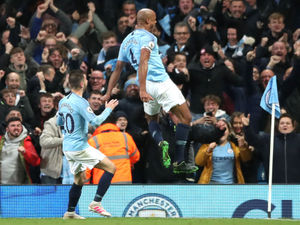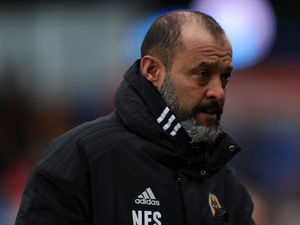Next Wolves manager: TIM SPIERS on why too many cooks have spoiled the Molineux broth
It was hard to envisage all this happening on August 20, just a couple of months ago.
On that day Wolves beat Blues 3-1 at St Andrew's thanks to a blistering second-half comeback. Walter Zenga's team played with intelligence, pace and passion as they claimed a memorable derby victory,
.
The scenes at full time were wonderful to witness. Jon Dadi Bodvarsson led a rousing Icelandic clap of 2,700 gleeful supporters. Zenga was so enthused he got down on his hands and knees and bowed towards the away end.
Just 73 days later the axed Zenga has been reduced to a minor footnote in Wolves' history and the team are seven points behind Blues, not to mention only three ahead of the relegation zone.
It's worth remembering that, of all their many summer signings up that point, only Bodvarsson lined up against Blues.
Zenga had worked a bit of magic with last season's underachievers, with Danny Batth starting the season in great form, ditto Joe Mason and Conor Coady, while Jed Wallace had arguably his best game in a Wolves shirt at St Andrew's.
Things were going swimmingly at that time. But the problems began when Zenga started to introduce his many new faces into the XI, making seven and five changes against Burton and Barnsley respectively the following month and picking up just one point. The subsequent wins over Newcastle and Brentford were merely a plaster on a gaping wound of indecision and, at times, naivety.
And that's a recurring theme in the past few months.
Jeff Shi and his team have undoubtedly tried to change too much, too soon, both in terms of the number of new players introduced, but also in the number of people making decisions.
The recruiting of new players, while a delicate and detailed process, should have a clear strategy and vision at its heart.
Instead, you had Jorge Mendes offering talented but unproven players from his huge stable of clients, Kevin Thelwell pushing for signings he'd done due diligence on for months (Bodvarsson being one) and Andrea Butti making suggestions from his time in France and Italy (Romain Saiss thought be one).
Wolves duly ended up with far too many new signings and no coherent strategy of how they would be moulded into a coherent, cohesive unit.
It would surely have been wiser to strengthen in key areas (a commanding centre half and a prolific goalscorer were priorities...but still haven't been accrued), bring in four or five players of real quality to add to a young and improving squad, and then take stock and add in January.
It's believed Zenga, the man paid to make all this work on the pitch, had little involvement in recruitment. So whose vision was this? And how can that be a sensible and workable strategy? Zenga, whose man management skills were questionable, was lumped with a squad of 27 (fit) players, many of whom didn't know if they were anywhere near the first team from one minute to the next.
Compared to when Kenny Jackett was in charge and a squad of 19 would travel to away matches, under Zenga a number of fringe players would board the coach not knowing if they were playing. Zenga would reveal the team close to kick off and often you'd see two, three or more of those not involved sat in the stands, glumly watching on.
While the team in always the priority, in 2016 players need mollycoddling, not confusing or aggravating for no good reason. It creates squad disharmony - so often a recipe for disaster.
With the Zenga experiment over and Butti also (surprisingly) shown the door, Wolves now do have an opportunity to begin rectifying some of the mistakes that have been made since Fosun's £30m takeover.
Thelwell, the man who diligently spent weeks screening candidates before recommending Kenny Jackett in 2013 (whatever fans think of him now, Jackett was without question the right man at that time), has been charged with leading the search for Zenga's successor, after having no say in the Italian's appointment.
That's a good start and should hopefully mean that Shi is going to start striking a balance between the 'old' Wolves and the 'new' Wolves.
It also means there should be fewer people sticking their oar in when it comes to identifying who that new boss should be. The 'too many cooks' approach is how Wolves ended up with candidates as diverse as old fashioned Brit Steve Bruce, international youth boss Julen Lopetegui and the up-and-coming youngster Marco Silva in the summer, before plumping for the well-travelled but erratic Zenga.
Mendes is a fantastic agent to be on good terms with and possesses the biggest contacts book in world football. His resources are almost infinite. But should he be having a word in Shi's ear on whether Zenga should have been appointed, or sacked? And who his replacement should be? Wolves fans would surely say no.
And while the age of the manager seems to have gone, whoever the head coach that Thelwell and, ultimately, Shi decides on unquestionably needs to have a bigger input in identifying where the team needs strengthening and who should be signed.
In narrowing their search to an experienced British manager who will steady the ship, it's ironic that just three months ago Wolves had a man who ticks plenty of boxes in Jackett.
But in Paul Lambert and Nigel Pearson, who would appear at this moment to be the front-runners to replace Zenga, they have the option of a 'step up' from Jackett, certainly in terms of track record.
There are strengths and weaknesses in both, but the manner in which Pearson left Leicester and Derby will count strongly against him.
Lambert worked wonders at Norwich City and was hampered by his owners at Villa and Blackburn.
The highly-regarded and well respected Rob Edwards also has a chance, but perhaps there's a happy medium in aligning Lambert with Edwards. Lambert, who actually signed Edwards on loan when he was in charge at Norwich, is thought to prefer working with a hands-on coach while he takes a more general overview, and in that respect it may be an idea fit.
Whatever decision they choose to make, Wolves and Fosun look to be learning lessons from the mistakes of the past few months.
That can only be of benefit to this sleeping giant of a club, whose fanbase deserves better than what they're getting right now. There's a reason that attendances both home and away still aren't rising. Wolves have got plenty of work to do to bring those lost fans back.





